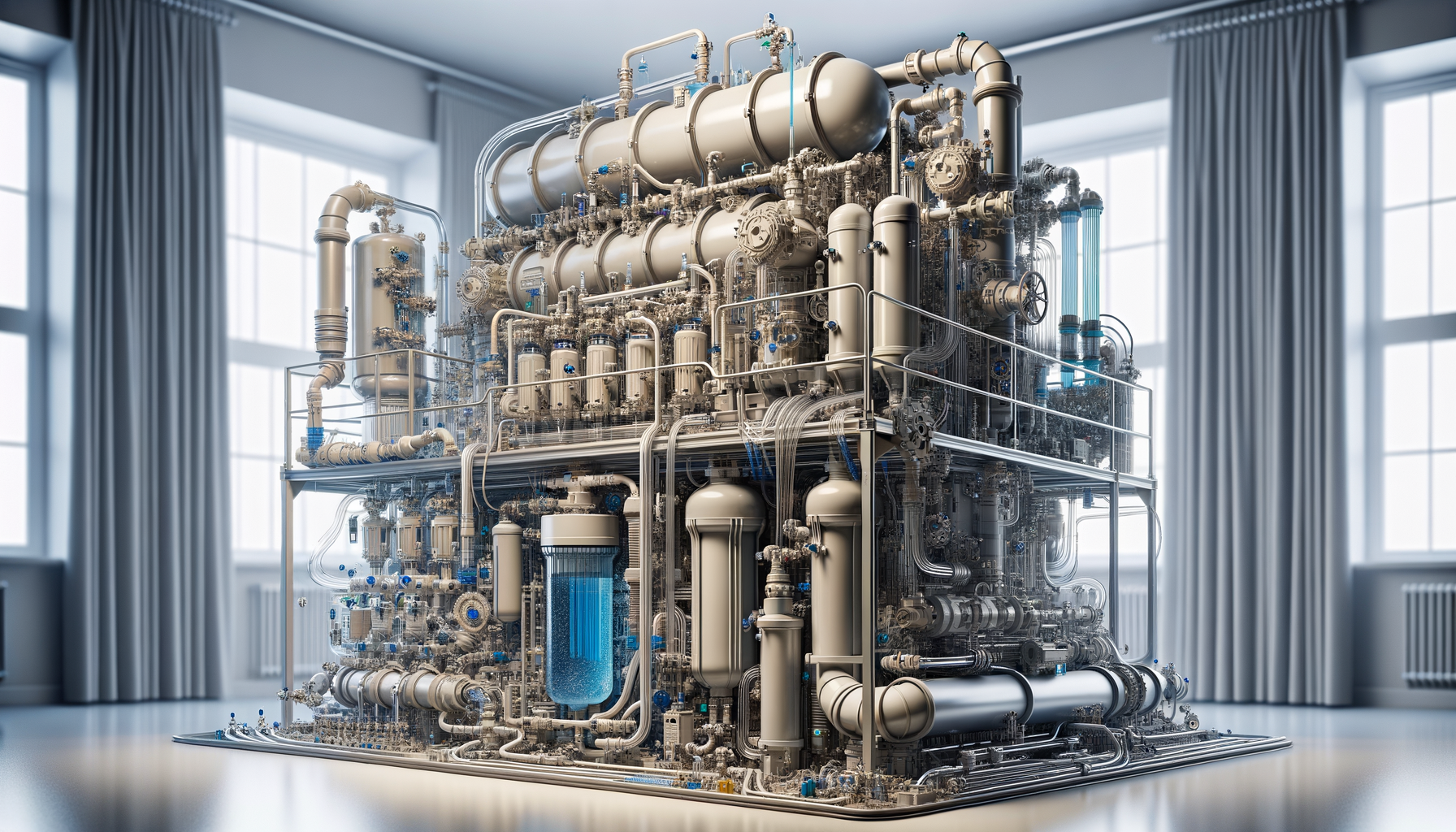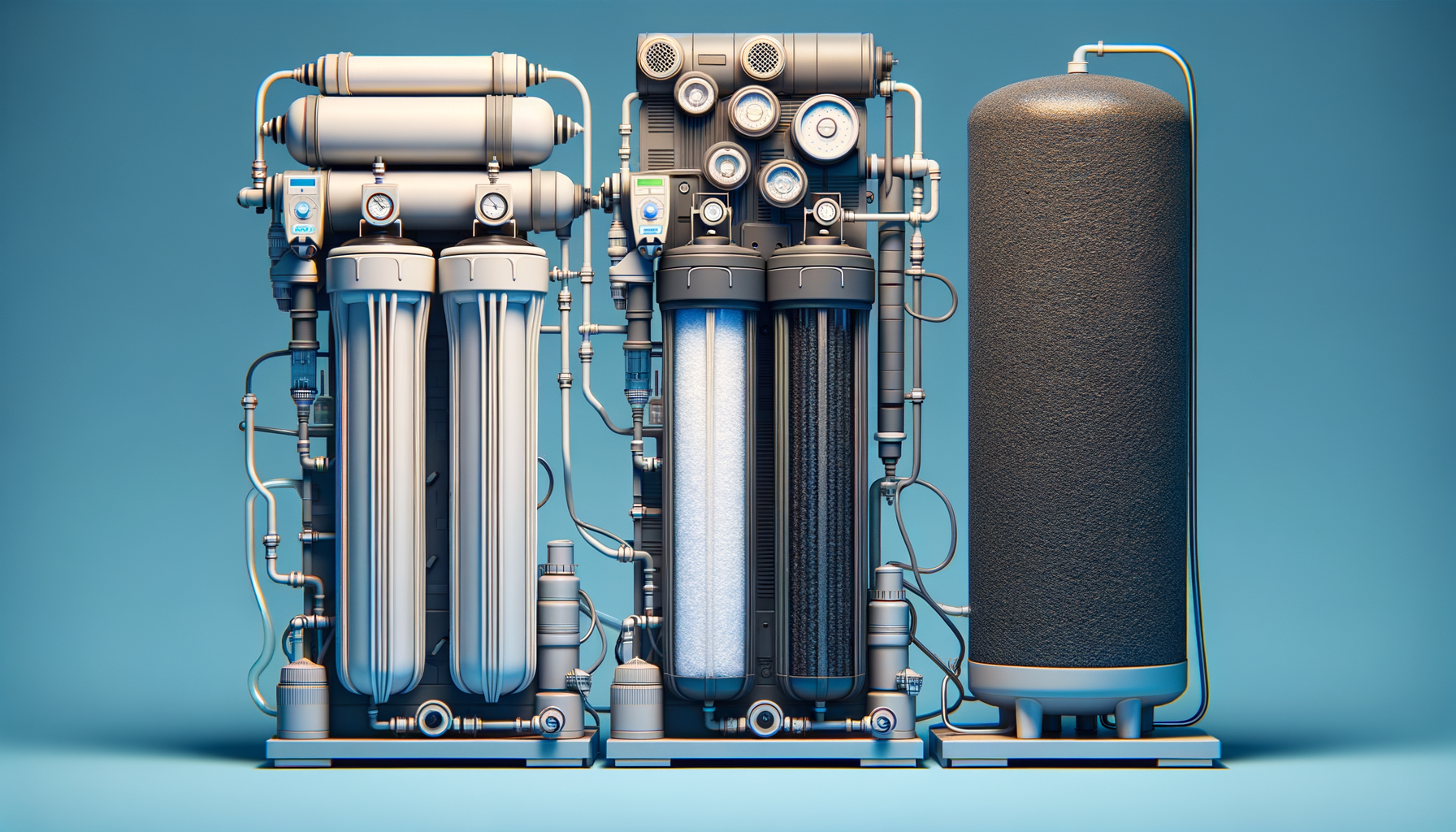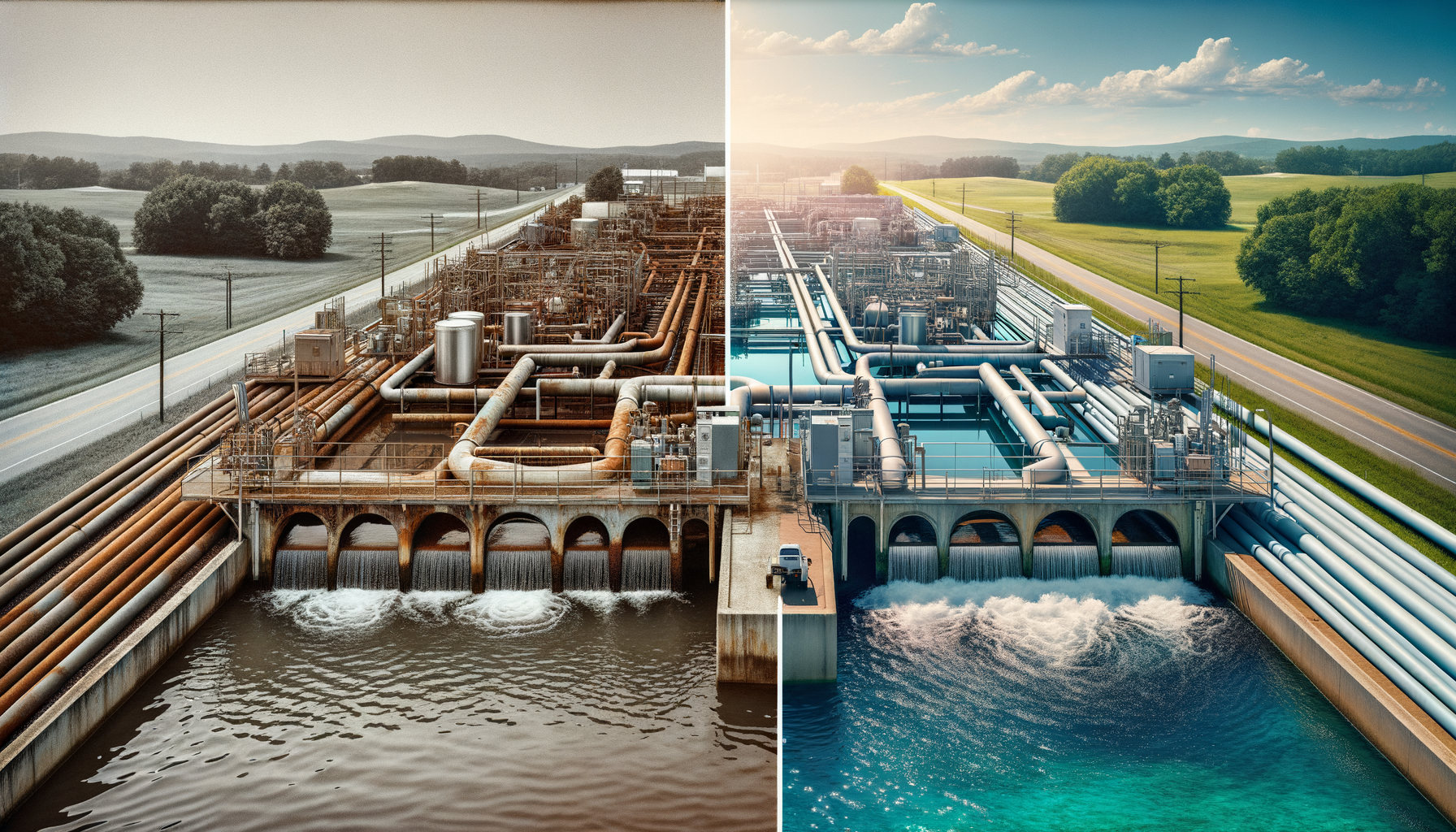Comprehensive Guide to Water Quality in Arkansas: Contaminants, Issues, and Water Filtration Solutions
by Ryan Moreau / updated February 13th, 2025
Arkansas is renowned for its abundant water resources—from the mighty Mississippi River along its eastern border to the pristine lakes and streams in the Ozark and Ouachita Mountains. Despite this richness, the state faces complex water quality challenges due to agricultural runoff, industrial pollution, mining operations, and naturally occurring contaminants. In this comprehensive guide, we explore the common contaminants in Arkansas’s water, regional water quality challenges, and effective filtration solutions. Start by using our Water Quality Tool to get a customized analysis of your local water conditions.
Overview of Arkansas’s Water Sources
Arkansas’s water supply is abundant and varied, reflecting the state’s diverse geography. Key sources include:
- Major Rivers: The Mississippi River forms Arkansas’s eastern border, providing water for agriculture, industry, and recreation. Other significant rivers include the Arkansas River, White River, and Ouachita River.
- Lakes and Reservoirs: Man-made lakes such as Lake Ouachita, Bull Shoals Lake, and Beaver Lake are important for drinking water, hydroelectric power, and recreational activities.
- Groundwater Aquifers: The Mississippi River Valley Alluvial Aquifer and the Sparta Aquifer are critical groundwater sources used for municipal water supplies, agriculture, and industry.
- Springs and Streams: In the Ozark and Ouachita Mountains, clear springs and streams provide water for local communities and ecosystems.
Maintaining water quality across these varied sources requires vigilant monitoring and effective management strategies, especially given the state’s reliance on both surface water and groundwater resources.
Common Water Quality Contaminants in Arkansas
Arkansas’s water sources may contain a range of contaminants due to agricultural practices, industrial activities, mining operations, and naturally occurring minerals. To better understand what might affect your area, start with our Water Quality Tool and then review these common issues:
1. Nitrates
Agricultural runoff is a major concern in Arkansas, particularly in areas with intensive farming activities. Elevated nitrate levels in groundwater can pose serious health risks, especially to infants, leading to conditions like methemoglobinemia or “blue baby syndrome.”
Water Filtration Options for Nitrates: Reverse Osmosis Water Filters
2. Arsenic
Arsenic occurs naturally in the geology of certain regions in Arkansas, particularly in the Gulf Coastal Plain and the Ouachita Mountains. Long-term exposure to arsenic can lead to various health issues, including skin lesions, cardiovascular disease, and increased cancer risk.
Water Filtration Options for Arsenic: Reverse Osmosis Water Filters, Specialized Iron and Arsenic Removal Systems
3. Bacteria and Microbial Contaminants
Private wells and surface water sources in Arkansas may be susceptible to contamination by bacteria, viruses, and protozoa, especially after flooding events. These contaminants can cause gastrointestinal illnesses and other infections.
Water Filtration Options for Microbial Contaminants: UV Water Purifiers, Reverse Osmosis Systems with UV Disinfection
4. Iron and Manganese
Many groundwater sources in Arkansas contain elevated levels of iron and manganese, which, while not typically harmful to health, can cause discoloration, staining, and an unpleasant metallic taste in water.
Water Filtration Options for Iron and Manganese: Iron and Manganese Removal Systems
5. Lead and Copper
Corrosion of household plumbing systems can lead to the presence of lead and copper in tap water. This is particularly a concern in older homes with lead pipes or solder. Exposure to lead can have serious health effects, especially in children.
Water Filtration Options for Lead and Copper: Activated Carbon Filters, Reverse Osmosis Systems
6. Pesticides and Herbicides
Agricultural activities can lead to runoff containing pesticides and herbicides entering water supplies. Chemicals such as atrazine and glyphosate have been detected in some areas and may pose health risks with long-term exposure.
Water Filtration Options for Pesticides and Herbicides: Activated Carbon Water Filters, Reverse Osmosis Systems
7. Volatile Organic Compounds (VOCs)
In some parts of Arkansas, industrial activities have led to contamination of water supplies with VOCs like benzene, toluene, and xylene. These compounds can have serious health effects, including liver and kidney damage, and increased cancer risk.
Water Filtration Options for VOCs: Activated Carbon Water Filters
8. Radon and Radium
Arkansas has regions where radionuclides such as radon and radium are naturally occurring in groundwater. Long-term exposure to these radioactive contaminants can increase the risk of cancer.
Water Filtration Options for Radon and Radium: Reverse Osmosis Systems, Ion Exchange Filters
9. Fluoride
While fluoride is added to municipal water supplies to promote dental health, some areas in Arkansas have naturally high levels of fluoride in groundwater. Excessive fluoride can lead to dental fluorosis and, in severe cases, skeletal fluorosis.
Water Filtration Options for Fluoride: Reverse Osmosis Systems, Activated Alumina Filters
10. Sulfates
Sulfates, such as magnesium sulfate and sodium sulfate, are commonly found in Arkansas groundwater. High levels can cause a laxative effect and impact the taste of water.
Water Filtration Options for Sulfates: Reverse Osmosis Systems
Regional Water Quality Challenges in Arkansas
Arkansas’s varied geography and economic activities contribute to regional water quality challenges. According to the EPA and the Arkansas Department of Environmental Quality (ADEQ), key challenges include:
1. Eastern Arkansas: Agricultural Runoff in the Mississippi Delta
The fertile soils of the Mississippi Delta region in eastern Arkansas support intensive agriculture. However, this leads to significant runoff of nitrates, phosphates, pesticides, and herbicides into surface and groundwater sources (EPA – Nutrient Pollution). These contaminants can cause algal blooms in water bodies and affect drinking water quality.
2. Northwestern Arkansas: Poultry Farming Impacts
Northwestern Arkansas is a major center for poultry farming. The disposal of poultry waste can lead to increased levels of nitrates and bacteria in nearby water sources. Eutrophication resulting from nutrient runoff is a concern in this area.
3. Central Arkansas: Industrial Pollution
Industrial activities around Little Rock and along the Arkansas River can contribute to the presence of heavy metals, VOCs, and other industrial pollutants in water supplies (EPA – Industrial Wastewater Management).
4. Southern Arkansas: Mining Operations
Mining activities, particularly for minerals like bauxite, have historically impacted water quality in southern Arkansas. Acid mine drainage can lead to increased levels of heavy metals and acidity in local water sources.
5. Ozark and Ouachita Mountains: Naturally Occurring Minerals
The geology of the Ozark and Ouachita Mountains can contribute to elevated levels of naturally occurring minerals, such as arsenic, radon, and manganese, in groundwater. While these minerals are natural, they can still pose health risks when present in high concentrations.
General Water Characteristics in Arkansas
Beyond specific contaminants, Arkansas’s diverse geology and landscape result in unique water characteristics. Understanding these traits helps in selecting the right treatment solutions:
1. Water Hardness
Water hardness varies across Arkansas. In many regions, particularly in the southern and eastern parts of the state, groundwater sources exhibit high levels of calcium and magnesium, leading to hard water. This can cause scale buildup in pipes and appliances and reduce the effectiveness of soaps and detergents.
For households experiencing hard water, water softeners are recommended. If you’re unsure whether you need a water softener or which type fits your family’s needs, try our Water Softener Calculator for personalized guidance.
2. Corrosive Water Conditions
In certain parts of Arkansas, especially where water is slightly acidic due to natural conditions, corrosive water can be an issue. This can cause leaching of metals like lead and copper from household plumbing systems.
- Acidic Conditions: Low pH levels in water sources can contribute to pipe corrosion.
- Older Infrastructure: Homes with older plumbing systems are more susceptible to issues caused by corrosive water.
To mitigate corrosive conditions, installing an acid neutralizer can help stabilize pH levels and protect your plumbing.
3. Impact of Regional Geology
Arkansas’s geology significantly affects water quality. Areas with limestone formations, common in the Ozarks, can lead to hard water due to calcium content. Additionally, naturally occurring minerals like fluoride and arsenic can be present in groundwater.
- Limestone Aquifers: Contribute to higher mineral content, resulting in hard water.
- Natural Minerals: Presence of arsenic, fluoride, and radium in groundwater due to local geology.
Whole house water filtration systems—using technologies like reverse osmosis or ion exchange—can help address these regional variations and maintain consistent water quality throughout your home.
Utilizing the Water Quality Tool for Arkansas Residents
Understanding your local water quality is essential for ensuring safe drinking water. Our Water Quality Tool enables Arkansas residents to:
- Enter their zip code for a detailed analysis of local water sources
- View data on common contaminants in public and private water supplies
- Receive personalized recommendations for filtration systems based on your water quality challenges
Recommended Filtration Solutions for Common Arkansas Contaminants
Based on the prevalent contaminants identified in Arkansas’s water sources, the following filtration systems are highly recommended:
1. Activated Carbon Filters
Activated Carbon Filters effectively remove chlorine, VOCs, pesticides, and herbicides while improving taste and odor. They are ideal for municipal water supplies and well water affected by agricultural runoff.
2. Reverse Osmosis Systems
Reverse Osmosis Systems offer broad-spectrum removal of nitrates, arsenic, heavy metals, fluoride, and other contaminants. These systems are versatile for both under-sink and whole-house installations.
3. UV Water Purifiers
UV Water Purifiers are effective in eliminating bacteria, viruses, and other microorganisms, making them an excellent choice for private wells and surface water sources in rural areas.
4. Iron and Manganese Removal Systems
For households dealing with elevated iron and manganese levels, specialized iron removal systems can prevent staining and improve water taste and quality.
5. Water Softeners
Water Softeners address hard water issues by removing calcium and magnesium ions, protecting your plumbing and appliances from scale buildup.
Local Water Testing Services in Arkansas
Accurate water testing is essential to pinpoint the contaminants in your water supply. We recommend using SimpleLab for comprehensive water quality analysis. Their user-friendly kits and detailed lab reports empower you to make informed decisions about your water filtration system.
Case Studies: Addressing Water Quality Issues in Arkansas
Real-world examples provide valuable insights into how various water quality challenges in Arkansas are being addressed:
1. Eastern Arkansas: Reducing Nitrate Levels in Private Wells
In agricultural regions of eastern Arkansas, high nitrate levels in private wells prompted local communities to take action. By implementing best management practices in farming and installing reverse osmosis systems in affected homes, nitrate contamination levels have been reduced, improving health outcomes for residents.
2. Northwestern Arkansas: Addressing Poultry Waste Runoff
To combat water pollution from poultry farming, initiatives have been implemented to manage waste effectively. Farmers are adopting nutrient management plans and using buffer strips to reduce runoff into nearby waterways, resulting in healthier ecosystems and safer drinking water.
3. Southern Arkansas: Mitigating Industrial Pollution
Communities near industrial sites in southern Arkansas have faced contamination from VOCs and heavy metals. Through community advocacy and enforcement of environmental regulations, cleanup efforts have been initiated, and affected households have installed activated carbon filters and reverse osmosis systems to ensure safe water.
Call to Action
Arkansas’s abundant water resources are vital to its communities, agriculture, and industry. However, maintaining water quality requires vigilance due to diverse contaminants that can affect both surface and groundwater sources. Understanding your local water challenges and implementing effective filtration solutions is essential for safeguarding your household’s health.
Start by entering your zip code into our Water Quality Tool for a detailed analysis of your water supply. Then, explore our filter review articles to find the most effective system for your needs. Finally, confirm your water’s safety with comprehensive water testing services to ensure you have the clean, safe water your home deserves.







